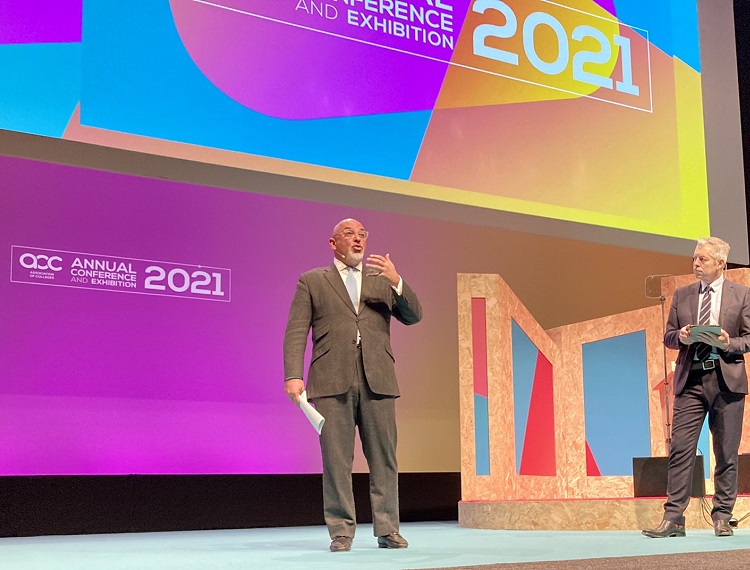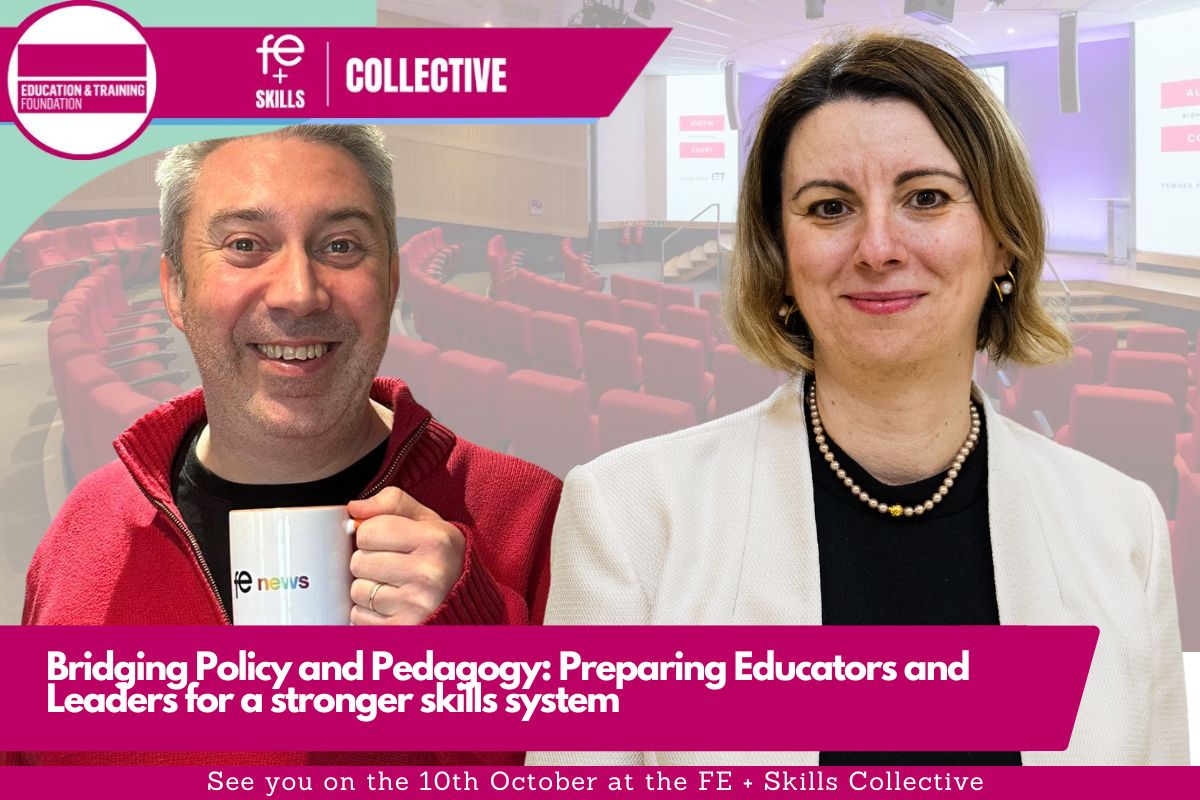Colleges are playing a central role in transforming skills and the way people progress into the workplace

#AoCConf21 – Education Secretary @NadhimZahawi addresses Association of Colleges conference:
Good morning. It really is wonderful to be here in person after what seems like an eternity of Zoom calls.
I would just like to say that I’m honoured to be among so many distinguished speakers, who hail from so many different professions and backgrounds.
Like your students, I am living proof that there is no such thing as a linear education journey. I started school in Iraq and if it hadn’t been for Saddam Hussein I would no doubt have happily stayed there. But under Saddam, I would have either ended up in one of his prisons or fighting in the war with Iran.
So instead, I came to this country with my family at the age of 11 without knowing a word of English… And look where I am now… in Her Majesty’s Government.
The point I am making is that there is no one, single route to a great career or a dream job. And I can say, hand on heart, that to stand here as Education Secretary is most definitely my dream job…
What you do, what your members continually do… with such success is to open doors for those like me who may have taken a path less travelled.
And so before I go any further, I would like to say thank you. The past 18 months have made life very difficult for all of you and I know that many of these challenges are still with us. But I have seen with my own eyes, on many of the visits I have been on, how brilliantly you rise above these….
For instance, I have met many young people who have one year of T Levels under their belts and I can tell you, you would never know they had been blazing a trail through a pandemic.
So I want to congratulate you for continuing to offer thousands of young people such a dynamic learning experience.
I know we are only just coming out of the dark age of Covid but I hope you will agree with me that it’s a really exciting time for further education.
We are about to enter a new era… it is the age of the skills economy.
Our Plan for Jobs is working – with the peak of unemployment forecast to be two million less than previously predicted. And wages are growing. We are transforming the way people progress into the workforce after the age of 16 and we will feel the benefit.
To my way of thinking – education and the economy are inseparable. We are in the business of dealing with the most valuable asset in the country – our people. Our economic recovery will depend on getting people with the right skills into jobs and this in turn will depend on employers telling us what those skills needs are, so that we can tailor education to meet them.
So how are we going to achieve this seamless link?
And when I say we, I do not just mean government. I mean you too because I regard this as a team effort. We are all in this together.
You will already be aware that there is a Skills Bill currently going through parliament. In fact, it had its second reading on Monday.
This sets out our vision of how we are going to strengthen local economies and level up every inch of the country, boosting productivity and making this country stronger, more competitive and ultimately more prosperous.
And at the heart of this is a network of world-class colleges.
Our apprenticeship reforms have already put employers at the heart of the skills system, and colleges and training providers have responded.
I would like to thank the hundred or so colleges that have already embraced T Levels. The really exciting news is that all colleges that signed up to T Levels from 2023.
T Levels are the future. We are going to deliver the skills economy and I want you all to be recognised as the team that delivered.
We need to build further and ensure far closer alignment between colleges and employers right across our skills system.
Local Skills Improvement Plans will be seeing more creative partnerships between employers and colleges to deliver the skills local economies need. The number of Institutes of Technology will expand further, improving technical education at levels 4 and 5 and we are rolling out more Skills Bootcamps.
And I would love to see even more colleges involved in delivering apprenticeships. Currently around 30% of apprenticeships are carried out in colleges, but if we really want to transform supply we will have to grow that number. I know colleges are more than capable of it.
I just want to spend a few minutes talking about how I see this new era unfolding.
One of things I made sure of in my last job as vaccines minister, was that when we knew something for a fact, we acted on it. But we did not rush in until we were sure. I think the fact that we managed to achieve the biggest, fastest vaccination programme the world has ever seen showed that this was a pretty effective approach.
It is one that I am determined to continue. We must act on evidence. We cannot charge in making changes without knowing whether those changes are going to work.
And the flipside of that is that when we know they don’t, we must stop.
Acting on evidence is one of the reasons why I have decided to take a more nuanced approach to BTECs.
It is right that we are simplifying the qualifications system. Students entering higher education with some BTECs are more than three times as likely to drop-out of their course than those entering with just A levels. And there are over 12,000 qualifications at Level 3 and below, and in comparison, our competitors have 500 hundred or fewer.
I’m sure you would agree with me that the current qualifications landscape is tricky to navigate. Students deserve to know that every course they take is one that employers value and that leads to a good, skilled job.
Our reforms to the qualifications landscape are rightly ambitious, but we know that we would be wrong to push too hard and risk compromising quality.
That is why we have decided to allow an extra year before putting our reform timetable into action.
I have also listened to colleges, and removed the requirement that to get a T Level you had to have passed English and Maths GCSE – an unfair requirement that we don’t apply to A levels, and that could have barred some young people from, good, rewarding technical careers.
We have listened, and we have adjusted our approach accordingly.
One of the best ways of finding out whether something works is by giving it a thorough try out, which is why we are running pilots in numerous areas.
For example, we are funding 18 skills pilots in a number of areas including Teesside, Cumbria and Milton Keynes all of which target local needs. In Milton Keynes, for instance, there will be a focus on digital technologies, and how advancements in AI and automation are going to affect local businesses.
Another pilot in Cornwall and the Scilly Isles is looking to develop technologies and skills for a greener economy.
The pilot hopes to introduce businesses to the potential of green tech, as well as identifying what green skills needs exist in order for businesses to grow in a more sustainable and environmentally friendly way.
The £65 million fund will run to March 2022 and will see pilots working with local businesses to find out exactly what skills are needed in key sectors. In this way colleges can help learners and employers.
When these pilots tell us that something works and will increase and enhance the life prospects for young people, we’ll act on it. But not before.
Another way I intend to make sure we will give our national recovery a solid foundation is by using tactical interventions for shorter term needs for the economy, for example accelerating recruitment for HGV drivers to cope with the national shortage.
These short-term solutions will be harnessed to strategic – or long-term – reforms that are designed to change the culture and future-proof further education for decades to come.
We see T Levels, apprenticeships and the Lifelong Learning Entitlement as cornerstones for this approach.
Another reason for us to be optimistic about this new age is the latest spending review and I would like to spend the last part of my time with you today talking through what this year’s money means.
I am very grateful to my predecessor that we have secured such a great confidence boost in such a tight fiscal climate.
Overall the settlement is worth more than £86 billion. This funding will help more young people and adults gain skills that lead to good jobs, as well as delivering more per-pupil funding for schools and better starting salaries for teachers.
Out of the total pot, over the parliament there will be £3.8 billion more for further education and skills by 2024-25 to ensure people can access the kind of high-quality training and education that will not only lead to better jobs but that will also help the economy recover and flourish.
There is a £1.6 billion boost for 16-19 year olds by 2024-25.
When you take into account the uplifts in the two preceding spending reviews, this means an 26% real terms increase. That includes an additional hour a week for all 16-19 year olds to help learning recovery. It means more time for T Levels, more support for learning and ultimately more skilled young people entering the workforce.
We are putting £1.6 billon over three years towards making sure adults can upskill at any point in their lives, as part of the National Skills Fund commitment.
This will build on the Free Courses for Jobs offer we launched in April giving any adult access to their first Level 3 qualification for free. In a trial from next April any adult in England who earns a yearly salary below the National Living Wage will also have the chance to take these high value Level 3 qualifications for free.
This investment also sees the expansion of Skills Bootcamps training thousands more adults across the country in subjects like cyber security, coding and green technologies.
We will be spending more on T Levels to make even more places available. And with funding for apprenticeships rising to £2.7bn in 2024-25, more employers – and more small businesses – will be able to hire new apprentices and boost their productivity.
This means that wherever people live, and whatever stage they’re at in life, they’ll be able to get the training and education that gives them the skills that employers want and that can lead to a worthwhile and satisfying job.
In our Skills for Jobs White Paper we promised to deliver a multi-year funding regime for adults and the spending review has given us the settlement to put this into practice. So we look forward to working with you over the coming months to finalise the details and give you as a sector the certainty we know that you need.
What we have here is a great deal to build on for the future and I’m not just talking about recovering from a pandemic.
What we have is nothing less than the fuel that’s going to help turbocharge skills development in this country, and that means opening up opportunities for far more people and far more areas.
What we have, ladies and gentlemen, is nothing short of a social revolution driven by skills.
When I look at what you have achieved, especially over the course of the past 18 months, I am incredibly proud to be your Education Secretary. You have in me the most committed champion. I am looking forward to working with you to get this great country moving and to get our young people out into the world, full of promise and confidence and skills because of the start you have given them.
Thank you all.
Nadhim Zahawi, Education Secretary










Responses